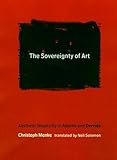The sovereignty of art : aesthetic negativity in Adorno and Derrida
Material type: TextPublication details: Cambridge, Mass. MIT Press 1998Description: xiii, 310 pages ; 23 cmISBN:
TextPublication details: Cambridge, Mass. MIT Press 1998Description: xiii, 310 pages ; 23 cmISBN: - 9780262631952
- 111.85 MEN
| Item type | Current library | Home library | Call number | Status | Date due | Barcode | |
|---|---|---|---|---|---|---|---|
 Book
Book
|
Institute of English Processing Center | Institute of English | 111.85 MEN (Browse shelf(Opens below)) | Available | ENG11789 |
Browsing Institute of English shelves, Shelving location: Processing Center Close shelf browser (Hides shelf browser)
Introduction: Autonomy and Sovereignty -- I. On the Negative Logic of Aesthetic Experience. 1. The Concept of Aesthetic Negativity. 2. Aesthetic Deferral. 3. The Aesthetics of Negativity and Hermeneutics. 4. On the Concept of Beauty -- II. An Aesthetic Critique of Reason. 5. Aesthetic Sovereignty. 6. Problems in Grounding the Critique of Reason. 7. The Aesthetic Experience of Crisis. 8. Romantic and Modern Aesthetics: The Place of Art in the "Philosophical Discourse of Modernity."
Christoph Menke attempts to explain art's sovereign power over reason without falling into an error common to Adorno's negative dialectics and Derrida's deconstruction. The error, which appeared even earlier in romanticism, is to conceive of the sovereignty of art as a reflection of the superiority of its knowledge; but art entails no knowledge, and its negativity toward reason cannot be articulated as an insight into the nature of reason. Rather, art is the medium of an experience that confronts reason from the outside with an insurmountable, never-ending crisis. Art is sovereign not despite, but because of, its autonomy. Its power to subvert reason depends on its separateness from reason. Menke brings to his arguments a firm grounding in both philosophy and literary studies, as well as familiarity with German, French, and American sources
There are no comments on this title.






